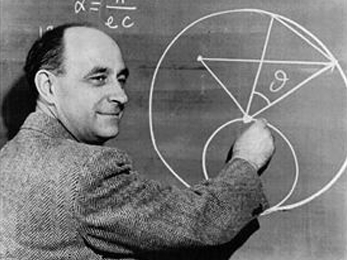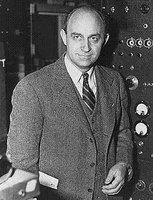Enrico Fermi
Fermi, Enrico
Enrico Fermi (1901-1954), an Italian-American physicist who played a key role in the development of the first atomic bomb. He was one of the leaders of the team of physicists on the Manhattan Project, the U.S. government's program to develop the atomic bomb. In 1926, Fermi discovered the statistical laws, now called Fermi-Dirac statistics, that govern the particles subject to the Pauli exclusion principle; such particles are called 'fermions' in Fermi's honor. Throughout his career, Fermi developed the mathematical statistics required to clarify a large class of subatomic phenomena, discovered neutron-induced radioactivity, and directed the first controlled chain reaction involving nuclear fission. This demonstration of nuclear fission took place in Chicago on December 2, 1942 in a volleyball field situated beneath the University of Chicago's sports stadium. Fermi was awarded the 1938 Nobel Prize for Physics.
Further Reading
- ChemCases.com. Nuclear Chemistry: First Chain Reaction.
- Nobel Foundation. Enrico Fermi - Biography.
- PBS Online. A Science Odyssey: Fermi Creates Controlled Nuclear Reaction.

